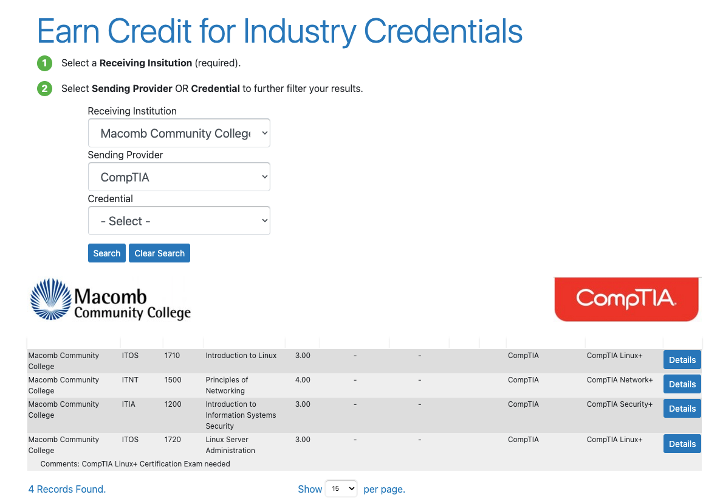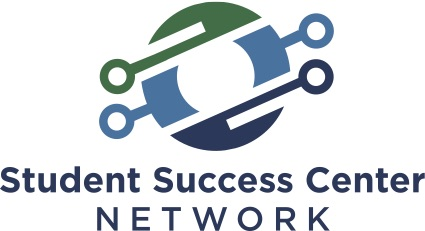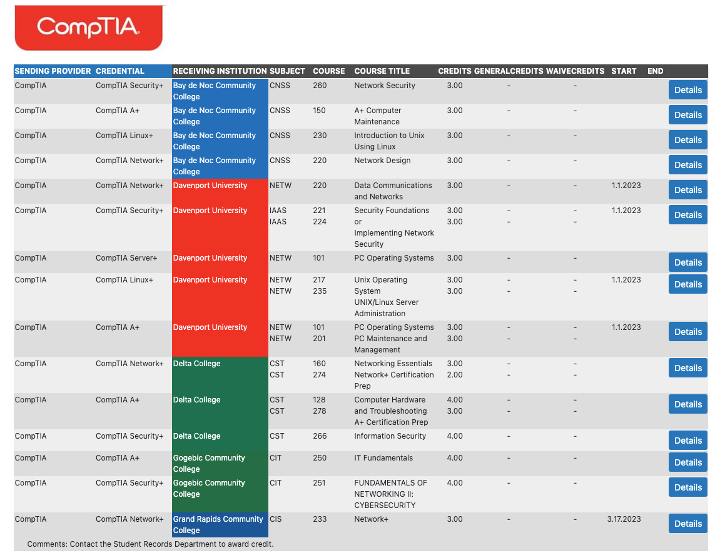
Empowering Michigan's Workforce: How Michigan's Center for Student Success Connects Industry Credentials and Higher Education
November 7, 2023
At a Glance
Over the past three years, the Michigan Center for Student Success (MCSS) at the Michigan Community College Association (MCCA) has focused on implementing the statewide Strengthening MiWorkforce Pathways project with generous grant funding from the Ascendium Education Group. The workforce-focused initiative is one of many system-level efforts among states in the Student Success Center Network that embrace and recognize learner agility and learning that happens outside the traditional classroom. The explicit focus on credit for industry credentials provides a framework for state-level strategies supporting community colleges’ efforts to improve student completion rates.
The Opportunity
Community colleges have a long history of awarding credit for prior learning (CPL) through Advanced Placement (AP), College Level Examination Program (CLEP), International Baccalaureate Diploma (IB), military credentials, and other popular forms of CPL. However, too few adult learners who returned to community colleges understood how to earn credit for industry credentials, and few colleges had a clearly defined process to award credit. As more Michigan adults leverage tuition-free paths to associate’s degrees through the Michigan Reconnect program, the Michigan Center for Student Success (MCSS) saw an opportunity to expand CPL opportunities to include credit for industry credentials.
The Center sought to address three key challenges:
- Better communicate how students can earn credit for industry credentials.
- Improve the student experience through improved institutional policies and practices to award credit for credentials.
- Incentivize institutions to expand credit for prior learning opportunities through a unique funding model.
Overview
Generously funded by the Ascendium Education Group, the Strengthening MiWorkforce Pathways project aims to strengthen equitable access to and through workforce programs by network-building with a strategic focus on program design, alignment with local labor market needs, incorporation of industry-recognized credentials, progress into bachelor’s degree programs, and deployment of timely advising interventions to maintain student momentum.
Under the initiative, the Center focused on supporting colleges in their efforts to award academic credit for industry-recognized credentials. The strategy focuses on delivering professional development to colleges to:
- Develop and adapt equitable credit for prior learning policies
- Establish credential and course equivalencies
- Design an equitable process to award credit
- Communicate credit equivalencies and policies to students and employers
According to The PLA BOOST: Results from a 72-Institution Study of Prior Learning Assessment and Adult Student Outcomes Fact Sheet, credit for prior learning programs is shown to boost completion rates by 25% for adult community college learners, 24% for Hispanic adults, and 17% for Black adults. This data point demonstrates why credit for prior learning programs remains a critical strategy to engage adult learners who often reenter college with some prior credentials or skills gained through work experience.
Michigan improved its communication regarding how students can earn credit for industry credentials through the statewide transfer network
What is the relationship between college courses and industry credentials? While colleges and universities painstakingly document how college courses transfer between higher education institutions, the relationship between college courses and industry credentials is much less clear. While the Michigan Transfer Network provided comprehensive details on course-to-course transfer equivalencies, it did not include any information about how students can earn credit for industry credentials.
The new credentials database, launched in April 2023, has grown to include over 80 unique credential providers, more than 500 credentials, and over 600 course equivalencies across the state’s community colleges and a handful of four-year institutions. Credit may be awarded for specific licensures, certifications, apprenticeships, training academies, and other industry-recognized credentials. Industry areas where credits are available include health care, information technology (IT), manufacturing, culinary arts, digital media, skilled trades, business, and more. Prospective and current students, employers, and the public, along with college faculty and staff, can search the database by credential provider and receiving institution.
Macomb Community College awards credit for three CompTIA certifications, CompTIA Linux+, CompTIA Network+, and CompTIA Security+.
Students with various CompTIA certifications can earn credit at nearly 20 community colleges in Michigan.
Statewide commitment to enhance the student experience through improved institutional policies and practices to award credit for credentials.
Community colleges have well-established processes to request transcripts from applicants and award credit for coursework completed at other institutions. While the new credential database on the Michigan Transfer Network documented the relationship between college courses and industry credentials, colleges still needed to ensure that the student onboarding experience identified students who may be good candidates for credit and create or adapt institutional policies to award credit for industry credentials.
To support practices, the Michigan Center for Student Success (MCSS) hosted a series of workshops to support colleges in their efforts to establish equitable credit for prior learning policies and practices. The workshops, designed and delivered by Jobs for the Future (JFF), were attended by over 170 college-level administrators and faculty from across the state. The workshops centered on supporting faculty and staff to explore design considerations across the following focus areas:
Create Clear and Equitable Institutional Policies
- Institutions must establish clear, standardized policies for awarding credit for prior learning. These policies should be regularly reviewed for improvement. They must be grounded in transparent language and accessible to students and staff.
- Equity targets should be set, assessing uptake rates and outcomes across learner groups and programs. Costs should be reduced, and access expanded, including awarding credit for military credentials/service, CLEP, AP, and others.
- Clear processes for documenting credits on student records and transcripts should be created. Students should be made aware of a grievance process for unsatisfactory credit evaluations, communicated upfront before any payment for credential review.
Identify Wins to Align Industry Credentials and Communicate Value
- Colleges can collaborate with early adopters and local champions who see the value in awarding credit for prior learning. They should list established credits in a public database and identify courses suitable for credit by reviewing their catalog and learning outcomes.
- Dispelling common myths about credit for credentials, such as concerns about the depth of learning and quality standards, is crucial for buy-in. Research from The PLA Boost Report shows that students benefit from accelerated credential completion through prior learning credits.
Ensure Process is Integrated and Aligned with the Student Experience
- Introduce PLA opportunities during recruitment/enrollment.
- Inform students about credit awards before class registration.
- Clarify how earned credits replace courses.
- Provide informed staff, faculty, and advisors for guidance.
- Warn students if credit plans may impact transfers or financial aid.
All workshop resources and related materials are available on the Michigan Center for Student Success website.
JFF, the Student Success Center Network convener and technical assistance provider, was thrilled to be involved in Michigan’s efforts. Brianne McDonough, director at JFF said, “This has been an important initiative which deepens our understanding of what colleges need to build greater workforce alignment, support career-changers and adult learners, and consider the rapidly changing dynamic of in-demand skills learners need to develop to remain agile in their careers.”
Incentivize institutions to expand credit for prior learning opportunities through a unique funding model.
Awarding credit for prior learning can be a costly investment for institutions of higher education as institutions communicate with industry leaders, credential providers, employers, and students to ensure a strong relationship between courses and credentials. Michigan’s funding model does not provide any funding for credit awarded through prior learning. The Michigan Community College Association advocated for this type of policy to incentivize awarding credit for prior learning to support colleges in their efforts to develop equitable credit policies; more effectively communicate CPL opportunities with students, employers, and K-12 partners; and develop efficient and effective systems within the institution.
In Michigan, the state further committed to supporting credit for prior learning as a statewide strategy through Michigan Reconnect. Legislation passed in December 2022 created a process to reimburse community colleges at a rate of $80 per credit hour for credits awarded through a range of CPL types, including credit awarded for industry credentials. For example, if Macomb Community College awarded three credits for CompTIA Linux+, the college can receive $240 ($80 each for three credits) for awarding the credit. This policy incentive recognizes the costs associated with awarding credit for prior learning and showcases an important policy lever that incentivizes greater adoption of credit for prior learning programs among community colleges.
JFF’s Student Success Center Network is dedicated to advancing economic advancement and racial justice by dramatically and equitably increasing the number of students earning postsecondary credentials with value in the labor market.

